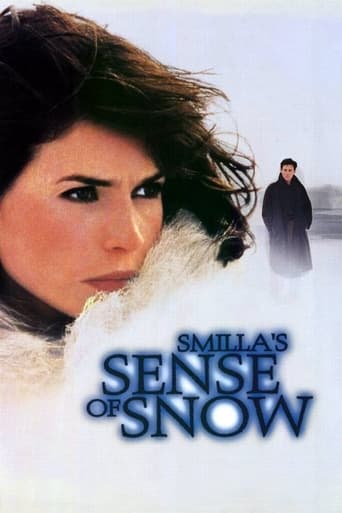

Good storyline that goes far and a heroine that is vulnerable and strong at the same time. Lots of courage to forge forward without being well informed. Very female James Bond, with a trail of death, and a precursor to the Girl with the dragon tatoo serie.
... View More'Smilla's sense of snow' introduces us to Smilla Jasperson (played convincingly by Julia Ormond) a young laboratory assistant working at the University hospital in Copenhagen. Smilla appears initially to be well blended into the workplace and life of the city but soon we realize that she is not a city person; she has grown up in the vast and snow-covered plains of Greenland with her Inuit mother and moved to Copenhagen after her mother's death.Smilla one day after returning from work witnesses the fatal fall of a young Inuit boy falling from a terrace. The police arrives just after her and question her about the event. Despite being in a state of shock she manages to look at the scene and from the footprints on the snow she believes that the death was not accidental: the boy was pushed or nudged to jump under a threat. From that day on Smilla's life will change. She is determined to find out the truth seeking initially help from her father (who prepares to marry again) and then from her neighbor, the enigmatic mechanic played by (the always good) Gabriel Byrne.'Smilla's sense of snow' is a very good thriller and Smilla is a very interesting heroine. We understand from the beginning that she does not feel comfortable in the city but at the same time tries to integrate without losing her Inuit identity. She seems fragile but her 'sense of snow' guides her to find the killer and her new identity. For her the death of the Inuit boy (that we get to know through a number of flashbacks) appears to signify the loss of her own innocence in a new world of norms and rules that she does not feel comfortable to abide by. The film is a well-crafted thriller from a good director (Bille August) with beautiful images of Copenhagen and the Arctic. A 8/10 from me.
... View MoreThis is a replacement comment, the original having been removed because of a complaint.Ordinarily, when there is a book involved, I prefer to judge the movie as independently as I can. But in this case, the movie is so tepid, and the book so alive I cannot avoid it.Toward the end of the film, a bad guy explains that the thing in front of him is not a meteorite. They are cold and dead and this is warm and alive he says. Then the film blows it up. I felt this way about the possibilities of the novel.It was originally written in Danish I think, but the English translation I read was superb. It was fashioned as a thriller/mystery, but the journey was through an inventive inner dialog that abstracted the world of Copenhagen as if it were Inuit, and human love and intrigue as if it were snow. It was not life-altering but striking and extremely well done. In the same way that science fiction can make the world more real by slanting it a bit, this made some female urges and fears more real and accessible to me than usual. I was affected.Inner dialogs in film are hard. Shifting abstractions to a set unfamiliar to the viewer is even harder. Trying to fit squarely in the thriller movie genre makes it impossible. So the failure is easy to understand, at least superficially. But there is something in the way the book moved that could have been captured in film without stretching the vocabulary much.Apart from the clever starting point and narrative perspective, and similarly apart from the conventional ending the amazing thing was how one morphed to the other slowly, continuously, seamlessly and without the reader even noticing. There were some things carried over: the book went from an inner ice to a real ice world. It went from internal mental battles to internal physical battles to simple physical battles. But these were not what was relied on. There was a deliberate evolution of the narrative stance. This is extremely rare, I believe, and it was knowingly controlled. I wish something like this had conveyed in the film.As it is, there is a mystery, then some lovemaking, then the thriller. I'm going to give this a two just based on the book.Ted's Evaluation -- 2 of 3: Has some interesting elements.
... View MoreParts were good but does not stand up on the whole. Very unrealistic and un-researched, asking the audience to swallow a lot of basic inconsistent crap, something that would get most continuity people fired in today's market. Eg. Why are they simply standing around an un-fenced off pool of deadly organisms in a pristine lab setting, not to mention that it's surrounded by slippery ice. Also, what was this GM's crime anyway? (He was likely doing what would have been done anyway by his own employees but with government regulation and observation.) The infection of the boy was not intentional. Not disclosing it was illegal but the child was treated/observed. Nowhere in this film is it mentioned or even properly implied that the boy might have been an experiment or that treatment was withheld purposefully so that they could watch the organism evolve in a human subject. It was implied though that the disease was untreatable and fatal in every case, that to disturb the "worm" was to invite catastrophe. That the boy was necessarily misused was not clear at all. Nor was it necessarily communicated that any kind of haste or greed was ultimately responsible for what happened, not at all. Director and screenwriter were asking a lot of the audience that should have been delivered by them. This also struck me as an exercise of moralization by people who were over their heads in the subject matter and taking their first run at it, making a lot of mistakes along the way and aimed at an audience whose level of candor/maturity was not up to the more rigorous detail and syllogisms of genuine ethical debate.Gave me a large headache.
... View More